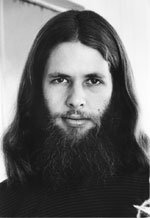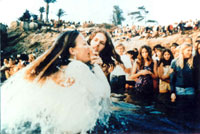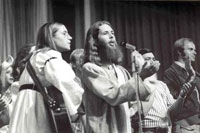Miracles and visions, signs and wonders, scandal and sin. If any of the stories about Lonnie Frisbee are true, he must have been one of the more dynamic and controversial figures to stride upon the evangelical scene in modern times.

Frisbee was still just a teen when he met Chuck Smith, an evangelical preacher who was looking for a way to reach young people in the late '60s. Together they turned Calvary Chapel into a thriving epicentre of the Jesus Movement—that tumultuous moment when counter-cultural youth and Bible-believing baby-boomers came together in a heady mix of dispensationalist theology, social experimentation and evangelistic rock 'n' roll.
Some years later, Frisbee met John Wimber and played a key role in the origins of the Vineyard movement. But his name has largely been written out of the history books. Why? Because he struggled with sin. Specifically, sexual sin. And even more specifically, he struggled with homosexuality, and he died of AIDS in 1993.
David Di Sabatino was researching a book on the Jesus Movement when he came across Frisbee's story and decided to restore him to his rightful place in evangelical history by producing a warts-and-all documentary on the subject. Frisbee: The Life and Death of a Hippie Preacher—rough cuts of which have already been shown at several evangelical churches and schools—premieres at the Newport Beach Film Festival on April 24.
Di Sabatino, who quit his job as editor of Worship Leader magazine to focus on filmmaking, spoke to Christianity Today Movies about his film.
Let's start at the very beginning. The opening credits call this "A Bible story by David Di Sabatino." How would you justify calling this a "Bible story"?
David Di Sabatino: Lonnie's life is very much like the characters that you would read about in the Bible; it's not a Bible story per se in that it comes straight from the Bible, but in another sense, a sideways sense, it does. You look at Lonnie's life and you parse it, and you see the foolish things confounding the wise, you see the eccentricities and the whacked-out character of Ezekiel, you see the frailties of Samson in his life, you see the prophetic, miraculous kind of stories that swirl around him like they did around Elijah and Elisha—so in a lot of ways, I stand behind that. Here's a guy who was flawed, and yet God used him.
How did you come across the Lonnie Frisbee story?
Di Sabatino: I came out of the Pentecostal movement, so I grew up with all these larger-than-life figures thrown about in front of my eyes, and when I started doing research on revivals and the Jesus Movement, I heard about Lonnie and just was fascinated by him. And I was drawn in initially by the stories, the larger-than-life stories, but as I went to flesh him out, I found a real human being with a lot of problems, and in order to contextualize it, I had to deal with all of it—which was extremely difficult, because some of the things he was dealing with, I really had no understanding of. So I had to rely on going to other people and ask, you know, "What does it mean to be raped as an eight-year-old child? What does that do to you?" So it stretched me in that sense. I don't know much about psychology, but I feel that I have some grasp now, of at least what he went through.
Were you surprised by these flaws that you saw in Lonnie?
Di Sabatino: At first, of course. We grew up with the holiness impulse in conservative evangelicalism that says once you are saved, you're striving for perfection. So yeah, I didn't know what to do with that, because my matrix was so black-and-white, and as I've gone along, my life experiences have filled in, and I realize there is a lot more gray than there ever was black and white. So again, I go back to Lonnie being raped as an eight-year-old.What does that do to somebody? It fragments your identity, and now I can't say that I'm surprised at all.
What's that U2 song? "I have spoke with the tongue of angels, I have held the hand of a devil." So you're both of these things, you're angel and devil—and that's all of us, really. We're capable of great, great things. We're also capable of great devastation.
Someone in the film makes the point that all the experimentation with drugs back then opened people up to the supernatural, and thus to God. And some people might ask whether Lonnie was really moved by the Spirit, or whether he was just on another trip.
Di Sabatino: You have to remember the context of back then. LSD wasn't illegal . . . and I think it was the lubricant for a lot of spiritual experiences. And if you were really searching, that search ended up with some sort of faith. So when these missionaries came up to the Haight-Ashbury district, they didn't have to offer up an apologetic for God—that was a really open time, and drugs were just part of the story. Lonnie was searching. He went through a lot of stuff before he got to God, and a lot of people will look at that and say it was false, and they will say God can't bring people through a lot of that mess, but he did with Lonnie.

What about the miracles? Do you think they were genuine?
Di Sabatino: Yeah, sure, why not? Stories are what they are. Not that I'm trying to prove anything to anybody, but there are people there that didn't really like Lonnie, and 20 years later, their 15-minute encounter with him is the formative shaping moment of their life.
I didn't want this to sound like . . . I was propping him up as some sort of faith healer. But I'm telling you, the people I spoke to saw things that didn't make sense to them. Chuck Smith Jr. is something of a Thomas, but he was there and he says Lonnie was real and genuine and almost impossible to explain because it was too weird. None of them could explain Lonnie. This guy is so far outside of the matrix of anything we understand rationally. But I'm open to people saying, "Yeah, right. I don't believe a word of it." There are other things about his life that are interesting. This story is multifaceted.
Considering the role that his homosexuality plays in his story, it is striking that we don't see any firsthand interviews about that.
Di Sabatino: This was a tough thing. I brought to light some things that not a lot of people knew. I've been in rooms with his family where I've had to tell them that he defined himself as gay, way back. Nobody knew that. There's been some tense moments behind the scenes.
Now I love these people, and one of the things I wanted was for them to give the thumbs up to this story, but there were times when we battled. I would go over to his friends' house and play this thing and they would reel, because I had things from Mel [White, an evangelical author turned gay activist] or Troy [Perry, a bishop with the pro-gay Metropolitan Community Church], and they would say, "How could you do this?" But by the time we screened it at Set Free Church, earlier this year in February, I think things had calmed down.
The hardest thing has been with some of the women who had a really close relationship with him, not in a physical sense but in a brother/sister sense. Lonnie admitted a lot of things to them, but I think he stopped short of telling them a lot of his sexual dysfunction because he didn't want to hurt them, or because he didn't want to be hurt. His early testimony at Calvary Chapel was that he had come out of the homosexual lifestyle, but he felt like a leper because a lot of people turned away from him after that, so he took it out of his testimony—and I think that's an indictment of the church.
Would you consider sending this film to gay and lesbian film festivals?
Di Sabatino: Absolutely. And I've already applied for some of them. That's where I want this played. I have made no bones about this. My primary goal was not to make a documentary for Christians. I would like them to see this, but that's not my primary goal. I want to go to the people that Lonnie went to, and that would be the disenfranchised.
I have made this documentary in the spirit of Lonnie—edgy, on the cusp, on the periphery, truthful, and with an eye toward those who were on the margin of society. And the premise of the movie is, "If God can use this guy, then you're all invited." And the ironic thing is that the face of God on earth, the Church, is turning people away because they're not up to snuff. And I think we need to revisit that.
What if people accuse the film of being pro-gay?
Di Sabatino: That's okay. I'm pro-people. I'm not pro-gay. I went to those guys [White and Perry] out of the honesty of my heart. Who better to talk about being part of the evangelical community and being ostracized? I shared my convictions with them. But I like them, and they were honest.
Honestly, how many times a day do we look at something and say, "I don't agree with this?" Why can't we do that with a film? This does not glorify that lifestyle. Nor am I in a position to make some sort of theological statement about it. I make theological statements, but that's not one of them. I like Brian McLaren's statement in Time magazine when he was asked what his views were on homosexuality, and he said, "There's no way that I can answer that without offending somebody."
Lonnie is not the poster child for gay Christianity. That would be a horrific thing to do to his memory. Voltaire said history is playing a pack of dirty tricks on the dead—turning Lonnie into a "gay preacher" would be a horrible thing to do to him. But neither is he this kind of Damascus-Road, I-once-was-gay-and-turned-away-from-this-lifestyle guy. He struggled.

How difficult was it to get people to talk about him?
Di Sabatino: His friends would talk. The people who were there would talk. The institutional people were a little more difficult, the people who were involved in those circles. The Calvary Chapel people were a little more closed-lipped than the Vineyard people, but the Vineyard movement has become a lot more decentralized since John [Wimber] died. Getting Chuck Smith Jr. to speak was a kind of coup. He's just such an honest guy, and I wish I could run the whole interview.
Both the Calvary Chapel people and the Vineyard people have come back to me to point to books where Lonnie's been mentioned, but I'm careful to say in the movie that his influence has not been properly contextualized. I don't think putting his name in one of the lines in a book means anything. There was a concerted effort not totalk about Lonnie.
What was your motivation in telling this story?
Di Sabatino: When I was at Queen's [University] in grad school, I remember telling this story to people, and their mouths just dropped, and they said this was a great story—even people who didn't care about the evangelical world, who looked at it as a circus, just resonated with the story. And I remember Mark Noll coming to Queen's that year and talking about the fact that, up until that point, his best-selling book had sold about 700 copies, and I thought, "If he can sell only 700 books, then what am I going to do?" We have to learn how to tell stories in a different way, and get out beyond our comfortable circles, and that's really where this was born, and looking at people whohave done that. U2 have been able to go out into the marketplace and bring stories, bring artistic endeavours, to a different level, and not necessarily with an eye on the Christian community.
So you expect over 700 people to see this film?
Di Sabatino: They already have. And I'm expecting to show it to a heck of a lot more.
For more information on the film, go to the official website. The film is not yet available for purchase on video, but you can sign up at the website for updates via e-mail.
Copyright © 2005 Christianity Today. Click for reprint information.











